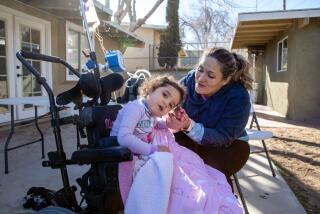Nurse in Dangerous ER Is in Good Condition to Leave
- Share via
It was “the gun incidents” that made emergency room nurse Kay Wiseman say to herself: There has to be a better--and safer--way to earn a living.
A few months ago, at the Harbor City hospital where Wiseman works night shifts, a patient fired a gun. Not long after, a patient’s mother waved a pistol, threatening to kill one of Wiseman’s co-workers.
This wasn’t the job climate that Wiseman envisioned when she got into nursing nearly 30 years ago. Over time, she’s watched ER work become dangerous and stressful. Some patients and their families don’t hesitate to bully, threaten and curse at nurses, she said. And “thank you” is a phrase rarely heard by harried staffers who sometimes put in 12-hour shifts without lunch or breaks.
Wiseman expects to keep working for at least one more decade. But at what? Nursing has been her calling. She deems herself “too old” to return to school and adds that she can’t afford any long-term, full-time course work. She’d like to maintain her $31-per-hour wages but wonders if this would be possible were she to leave emergency room nursing.
“I just don’t see any way I can get away from the bedside,” Wiseman said.
For guidance, the 57-year-old Long Beach resident consulted Donna Cardillo, a New Jersey-based career advisor who specializes in alternative vocations for nurses. Cardillo, who is also a registered nurse, assured Wiseman that her 20-plus years of critical-care work would be greatly valued by potential employers. Wiseman’s ER skills are readily transferable to other nursing specialties, such as forensic nursing and occupational health nursing, Cardillo said.
“You’re in a very, very good place,” Cardillo assured Wiseman.
Wiseman’s resume needs only minor tweaking, Cardillo said. The counselor recommended that Wiseman eliminate her stated career objective from the resume--most such references are limiting and vague, Cardillo said. In its place, Wiseman could substitute a summary of her best traits--”two or three powerful, punchy sentences describing the attributes which would be most desirable to an employer,” Cardillo said.
Wiseman should be sure to list all of her transferable nursing skills that employers may find valuable, Cardillo said. These may include personnel responsibilities, budgeting, teaching, training, public speaking, serving on interdisciplinary committees and participating in screening programs.
Last, Wiseman should delete references to jobs that she had more than 20 years ago. “They’re not relevant on the resume,” Cardillo explained.
Learning computer skills would enhance Wiseman’s marketability, Cardillo said. Wiseman should consider taking basic computer courses, perhaps at her local public library.
Additional advice from Cardillo and other nursing experts:
* Explore forensic nursing. Forensic nurses work in a variety of settings: emergency rooms, coroners’ offices, correctional facilities, insurance companies, police departments, law firms and consulting practices. They deal with people whose lives have been affected by rape, domestic abuse, assault or suicide attempts.
Their sensitive treatment of crime victims can help heal those traumatized by crime. Their ability to detect signs of abuse can save individuals from further harm. And their proper handling of such evidence as blood, bodily fluids, hair and fibers can prove pivotal to solving a crime.
“I cringe at all the evidence that’s lost in emergency rooms where no forensic training is available,” said Faye Battiste-Otto of American Forensic Nurses, based in Palm Springs.
To do their jobs well, forensic nurses must be versed in nursing, forensic science, police science and criminal law. Many move into this specialty by first becoming sexual assault nurse examiners or members of sexual assault response teams. Training courses in these specialties are offered by many hospitals and are also taught by nurse-entrepreneurs.
Some forensic nurses choose to specialize in handling domestic violence or child or elder abuse cases. Others receive additional training to become death investigators or nurse-coroners.
Should Wiseman be interested in pursuing any of these opportunities, she can join the International Assn. of Forensic Nursing, based in Thorofare, N.J. Wiseman’s emergency room training renders her eligible for full membership, which would enable her to attend the association’s annual meetings and network with other nurses in the field. The association’s Web site (https://members.aol.com/COCFCI/index.html) lists upcoming forensic nursing seminars, sexual assault response classes and death investigation training courses.
* Consider occupational health nursing. Occupational health nurses typically work with well populations. They promote health and wellness programs, perform medical screenings, give flu shots, administer first aid and deal with job-related injuries.
Employment opportunities are diverse. Occupational health nurses are hired by large corporations, government agencies, amusement parks, hotel chains, movie studios and manufacturing plants, among others, said Barbara Burgel, a clinical professor in occupational nursing at UC San Francisco.
Wiseman should have little trouble moving into this specialty, experts say. Some employers are willing to hire emergency room nurses as their occupational health-care workers, despite a lack of prior occupational health experience, said Kae Livsey of the American Assn. of Occupational Health Nurses, or AAOHN, in Atlanta.
Occupational nursing is “a growing field, and we’re encouraging as many nurses to go into it as possible,” said Violet Barkauskas, an associate professor at the University of Michigan’s School of Nursing in Ann Arbor.
But, say many in the field, Wiseman should be forewarned: Opportunities “wax and wane” with the economy. When employers make staffing cutbacks, occupational health nurses sometimes find themselves among the first to go.
To learn more about this field and meet with established occupational health nurses, Wiseman can contact the AAOHN and apply for affiliate membership. This would enable her to attend association-sponsored conferences and take continuing education courses to sharpen her knowledge.
“What draws people to occupational health nursing is that it’s a very independent role,” said Marion Gillen, assistant professor in occupational health nursing at UC San Francisco.
Indeed, autonomy is common in this specialty. Occupational health nurses often are the only health-care workers at their employment sites, Livsey said.
Some occupational health nurses who prefer not to be tied to a single employer sign up with local registries, which match them to short-term assignments, said Pam Harbor-Cannon, president of the Southern California Assn. of Occupational Health Nursing in Los Angeles.
For now, Wiseman would be well-advised to research the two specialties further and visit forensic and occupational health nurses on the job. This could help her determine whether these nursing roles might be preferable to her emergency room responsibilities.
(BEGIN TEXT OF INFOBOX / INFOGRAPHIC)
Time for a Change
* Name: Kay Wiseman
* Occupation: Emergency room nurse
* Desired occupation: Uncertain
* Quote: “Up until about 1980, nursing as a profession had some fulfillment. Today we have families and patients with weapons in our emergency room. We are threatened and cursed at.”
Counselor’s Recommendations
* Look into forensic nursing and occupational health nursing.
* Tune up resume and bolster interview skills.
Meet the Coach
Donna Cardillo, RN, is president of Cardillo & Associates, Professional Development Seminars, in Wall, N.J., and a health-care career advisor at Monster.com. She has also released a video and audiotape called “Career Alternatives for Nurses.”


